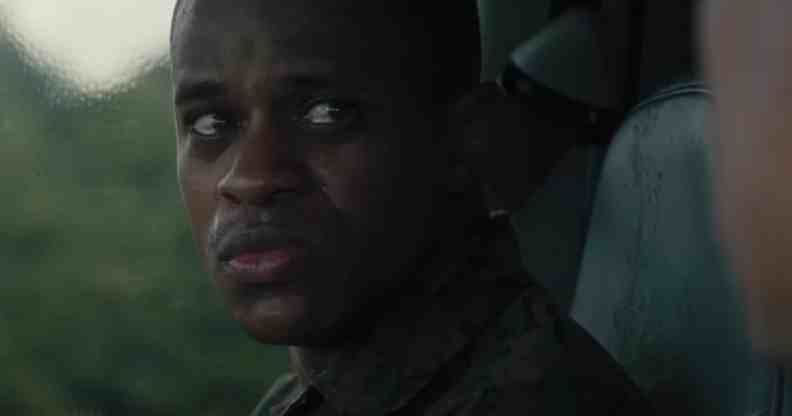Gay, Black man who served in military under Don’t Ask, Don’t Tell tells his story in new A24 film

Jeremy Pope as Ellis French in The Inspection (YouTube/A24)
The Inspection, a new film starring Jeremy Pope and Gabrielle Union, tells the true story of a gay, Black man who found his worth after joining the Marines.
Writer and director Elegance Bratton was kicked out by his mother aged 16.
“I spent the next 10 years of my life homeless,” he tells PinkNews.
“I thought I was worthless, because I was gay. And then I joined the Marine Corps. And my drill instructor told me that I had value and I was important because of my ability to protect the person to my left and to my right.
“I think for me, that was a transformational moment.”
Bratton loosely retells his story in The Inspection, starring Jeremy Pope and Gabrielle Union as fictionalised versions of himself and his mother.
The A24 film is Bratton’s debut fictional narrative, and is produced by his husband Chester Algernal Gordon.
Both Bratton and Gordon acknowledge the fraught history the US military has with the LGBTQ+ community. From 1994 to 2011, the Don’t Ask Don’t Tell policy barred openly gay, lesbian or bisexual people from military service.
“This is not a pro-military or anti military film. This is a pro-troop film,” Gordon explains, speaking at The Inspection’s European premiere, at the BFI Film Festival in London.
Bratton adds: “This is not about a diatribe about the military. This is one young man’s journey to win back his mother’s love against all odds.”
The film not only centres the experiences of a gay Black man, but stars a gay Black actor, Pope, in the lead role, something that was important to Bratton.
“The reason why we had to cast an out queer Black actor is because Black queer people in the United States are going through a lot of turmoil,” Bratton says.
He continues: “One out of two will be HIV positive in their lifetime. They are eight times more likely to commit suicide and be homeless.
“We wanted to create a character that can make Black queer people feel really proud of themselves.
“And understand whatever struggles that they’re about to go through in their life, they have the light and the power within them to actually succeed and thrive.”
Giving his perspective on the discourse surrounding whether LGBTQ+ actors should exclusively be cast in LGBTQ+ roles, he adds: “It’s extremely important to cast authentically but it’s also extremely important to remember this is make believe.
“The way I look at it is that cinema is maybe 120 years old and we have been having conversations about what it means to play a person of colour or gay person for the past 15 to 20 years.
“White straight men have had a 90 year head start on being everything so maybe it’s time to make up for that disparity.”

Chester Algernal Gordon and Elegance Bratton attend The Inspection European Premiere. (Jeff Spicer/Getty)
As the film arrives in London, Bratton hopes The Inspection will have an impact on the industry in the UK.
“My good friend, Topher Campbell is a Black queer filmmaker here,” he explains, “And we often speak about the fate of visibility and representation for queer people of colour.
“A lot of my Black queer friends who are trying to make movies in London, often talk about how hard it is to get people to support them.
“Now that we are closing the BFI London Film Festival with a Black queer story, I hope some of these British producers are like, ‘We’d like to get on the on this trend’, and make some of my friends’ movies.”
Gordon and Bratton were both artists when they met and have worked on several projects together since marrying.
“I think that once we merged it was like something magical happening,” Gordon says..
“He’s the most beautiful person I’ve ever seen in my life.” Bratton adds.
“Ultimately my 13 year old self would be very happy with this outcome. I found the love of my life.”

